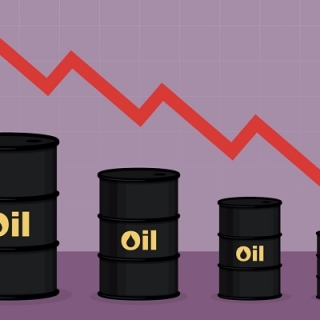


Oil prices fell about 1% on Wednesday, as a U.S. tariff policy change fueled uncertainty, prompting traders to weigh the potential impact of the U.S.-China trade war on economic growth and energy demand.
Brent crude was down 66 cents, or 1.0%, at $64.01 a barrel by 0630 GMT, while U.S. West Texas Intermediate crude was down 69 cents, or 1.1%, at $60.64. Both benchmarks fell 0.3% on Tuesday.
Global oil demand is expected to grow at its slowest rate in five years in 2025 and U.S. production growth is also set to ease, due to U.S. President Donald Trump's tariffs on trading partners and their retaliatory actions, the International Energy Agency said on Tuesday. "Investors continue to struggle to find catalysts to drive a more meaningful recovery, as global growth is widely expected to slow amid US tariffs, which are hurting oil demand," said Yeap Jun Rong, market strategist at IG.
"The downtrend in oil prices remains intact and we may expect the initial optimism around tariff removal to fade, and underlying macro headwinds in upcoming economic data could bring the market back to a more sobering reality," Yeap said.
Global oil demand this year is expected to rise by 730,000 barrels per day, the IEA said, down sharply from the 1.03 million barrels per day expected last month. The decline is larger than the demand estimate cut made on Monday by the Organization of the Petroleum Exporting Countries.
The tariff dispute between the US and China remains the most significant threat to the global economy and oil demand, said Imad Al-Khayyat, head of research at the London Stock Exchange Group.
"Every week that passes without any sign of easing in this impasse increases the likelihood of a global recession and lowers the ceiling on prices," Al-Khayyat said.
Concerns over Trump's escalating tariffs, combined with rising output from OPEC+, a grouping of OPEC and its producer allies such as Russia, have dragged oil prices down about 13% so far this month.
Uncertainty over trade tensions has prompted several banks, including UBS, BNP Paribas and HSBC, to cut their crude price forecasts.
Trump has raised tariffs on Chinese goods to record levels, prompting Beijing to impose retaliatory duties on U.S. imports in an escalating trade war between the world's two largest economies that markets fear could trigger a global recession. Meanwhile, U.S. crude stocks rose by 2.4 million barrels in the week to April 11, while gasoline inventories fell by 3 million barrels and distillate stocks fell by 3.2 million barrels, market sources said, citing figures from the American Petroleum Institute on Tuesday. (Newsmaker23)
Source: Reuters
Oil prices edged higher but remained on track for a second weekly decline. West Texas Intermediate (WTI) briefly approached $60 per barrel, while Brent held steady around $63 on Thursday. However, bot...
Oil prices declined on Thursday as investors considered a potential supply glut, as well as weakened demand in the United States, the world's largest oil consumer. Brent crude futures settled down 14...
Oil prices edged higher on Thursday (November 6), boosted by easing concerns over a potential oversupply as sanctions against Russian companies began to take effect. After closing at a two-week low i...
Oil prices weakened on Thursday (November 6th) as the market digested rising US inventory data and lingering concerns about oversupply. WTI traded below $60 and Brent below $64, continuing its two-day...
Oil prices fell more than 1% on Wednesday, settling at two-week lows on pressure from concerns of a possible global oil glut, but data showing signs of strong U.S. demand for fuel limited losses. Bre...
Silver is trading in a high range (the December COMEX contract is around $48–49/oz) as risk-off sentiment spreads and the US dollar weakened. The sharp rise in Challenger job losses in October boosted market confidence that the Fed could cut...
Gold prices approached $4,000/oz on Friday (November 7th) after weak US jobs data reinforced expectations of an imminent Fed rate cut. Challenger job cuts nearly tripled in October—the largest increase in more than two decades—dampening optimism...
Hong Kong stocks fell 197 points, or 0.8%, to 26,282 in Friday's morning session, retreating after their biggest one-day gain since mid-August amid caution ahead of China's October trade data. Exports are expected to slow sharply after months of...
 Asia-Pacific markets declined on Wednesday, following a decline on Wall Street, which was driven by concerns about the valuations of artificial...
Asia-Pacific markets declined on Wednesday, following a decline on Wall Street, which was driven by concerns about the valuations of artificial...
 The Institute for Supply Management (ISM) is scheduled to release its October Services Purchasing Managers' Index (PMI) on Wednesday. The report, a...
The Institute for Supply Management (ISM) is scheduled to release its October Services Purchasing Managers' Index (PMI) on Wednesday. The report, a...
 World markets kicked off November in an upbeat mood, riffing off buoyant company earnings and calmer trade relations while batting away OPEC's...
World markets kicked off November in an upbeat mood, riffing off buoyant company earnings and calmer trade relations while batting away OPEC's...
 The ISM Services PMI rose to 52.4 in October 2025 from 50 in September, beating forecasts of 50.8, pointing to the strongest expansion in the...
The ISM Services PMI rose to 52.4 in October 2025 from 50 in September, beating forecasts of 50.8, pointing to the strongest expansion in the...